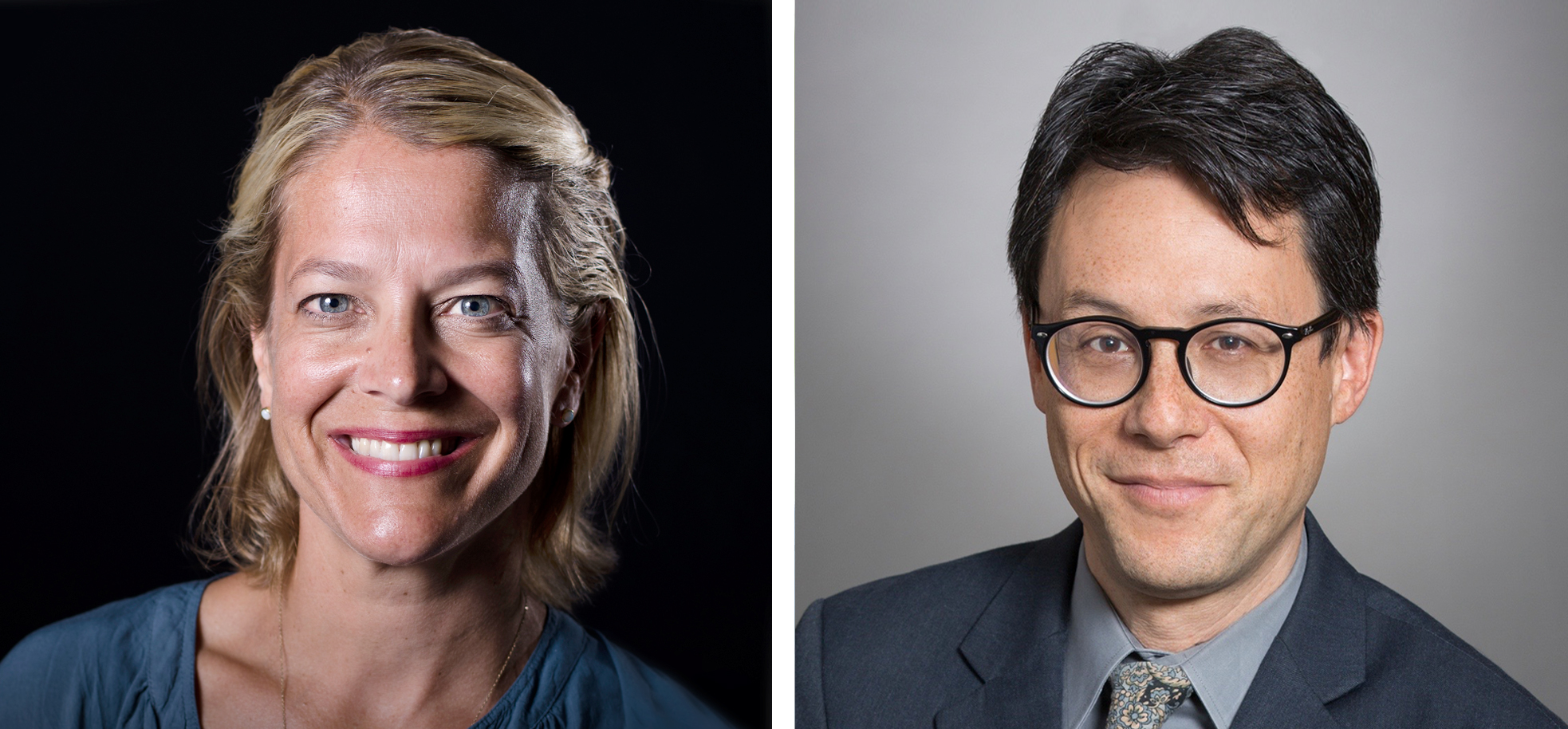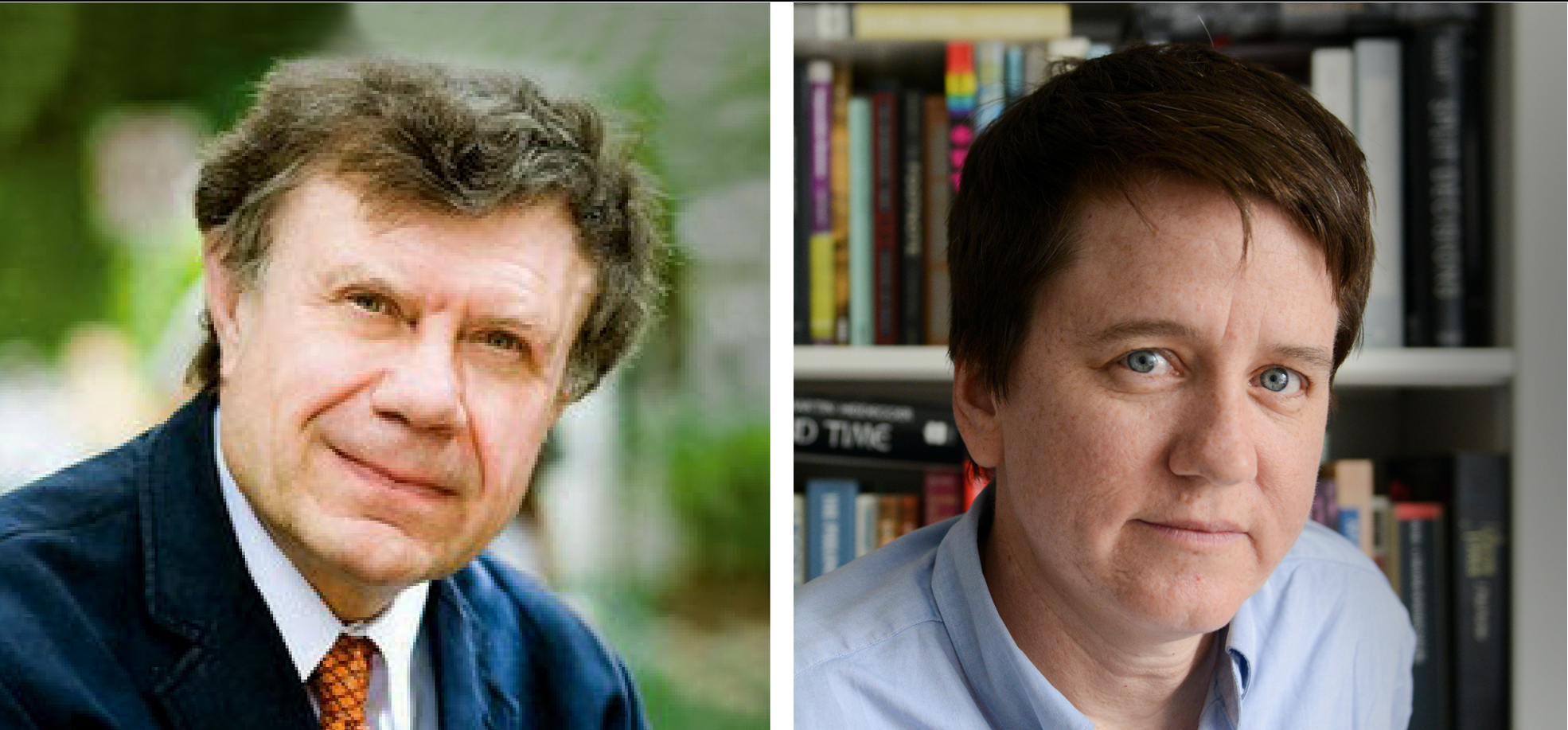Conversational and academic are not words that often go together, something that the Penn Arts and Sciences faculty who have participated in a new podcast series are more than happy to dispel.
In a recent episode that covers Thomas More’s Utopia, for example, Bethany laughs and points out to Milan that “one person’s utopia is another person’s hell.”
That’s Bethany Wiggin, Associate Professor of Germanic Languages and Literatures. She’s literally writing the book (or, at least, a book) on utopia, a literary and historical concept that has interested her since her undergraduate days. Though she’s an academic, her talk with Milan Terlunen, the host of the new podcast series “How to Read,” is casual, conversational, and inviting.
The podcast, produced by Columbia University graduate students Terlunen and Jess Engebretson, bills itself as “for curious readers of all kinds.”
Listeners have heard Paul Saint-Amour, Walter H. and Leonore C. Annenberg Professor in the Humanities, talk about social networks in the 19th century novel Middlemarch; Heather Love, Associate Professor of English, on description (versus narration) in 20th-century novels; Roger Chartier, Annenberg Visiting Professor in History, on the history of social reading and listening; and Wiggin on Philadelphia’s utopian roots and environmental humanities.
Saint-Amour likes the idea of academics “speaking plainly and passionately about what they do and why. When you hear someone talking about something they’ve devoted years of their life to studying, it warms it up.”
Podcasts, he says, are a great tool for opening up conversations and sharing knowledge more widely, on campus and off.
“Unless you’re in a particular field, you tend to have a pretty vague idea of what’s going on there and what people care about. That’s why it’s so interesting when Bethany Wiggin brings the environmental humanities sharply to life, or when someone in a committee meeting speaks up about soil biology or genetics or game theory in a way that’s clear and lively.
Love and Wiggin note the importance of talking with people outside of their fields. It makes their research clearer and more engaged.
“Most of my academic insights come from informal conversations with other academics, as well as friends outside academia,” Love says. “There is great value in describing your work to those who don’t know about it, and in talking about what motivates it.”
Wiggin agrees, saying “It’s really, really important to speak outside the academy. We need to open our doors wider, and we who are on the inside need to walk out of those doors more often to talk about our work and why it’s important.”
Speaking outside of the academy is an opportunity, but the scholars say it comes with its own unique set of challenges.
Chartier notes that though being interviewed for the podcast was not as in depth as, say, a published article or conference presentation, it required preparation—he worked to make sure he was communicating “rigorous knowledge” in the shorter format.
Wiggin is practiced at speaking to general audiences thanks to her role as director of the Penn Program in Environmental Humanities, but she admits the task can be “quite challenging, because wider audiences don’t share the same concepts or critical tools I can take for granted when talking with other historians.”
“But,” she adds, “I remain deeply committed to public-facing work, and I’ve become more literate about assumptions I bring to the table—I think I’m getting better at addressing wider audiences.”
Saint-Amour, Love, Chartier, and Wiggin all stress the value of sharing information and letting people in on what their work is really all about.
Saint-Amour points out that in academia people disagree, they change their minds as research grows, they fail and start again, and they constantly revise. That nuance and liveliness is sometimes invisible to those outside of academia.
“If we can share more of academia’s flexibility—the warm-bodied, back-and-forth, iterative way of thinking and being in the world—I think that would be better for everybody,” he says.
Download “How to Read” on iTunes or wherever you get your podcasts.
BONUS ANSWERS
We asked Saint-Amour, Chartier, Love, and Wiggin to extend the conversation. Here are their responses.
Saint-Amour
Q: Are there aspects of academia that don’t get talked about enough?
A: I’m always interested in hearing academics discuss failure and null results. We’re really good at publicizing people's achievements and successes, but in a lot of fields, null results are at least arguably publishable. It's still knowledge when you disconfirm a hypothesis. The story of people's wrong hunches and failures is often as interesting as revealing as the story of the glittering success—it’s valuable and humanizing at the same time.
Chartier
Q: Are audiobooks and podcasts a way to cultivate sociability, similar to earlier practices of reading aloud for entertainment and social value? In modern instances, the “reader” is at a distance—how is that similar or different from the older practices of social reading and listening?
A: It is necessary to stress the specificity of each form of social reading. They are not equivalent, but associated. Collective reading in the digital world can be extended to multiple readers, immediate and permanent, but without physical presence. Collective reading in the old forms of sociability is an event with a limited number of participants, with the encounter of the individuals and the experience of direct exchanges. Both contribute to the public space but very differently. Both must be practiced in a world that wrongly imagines that new forms of communication are equivalent to the more traditional ones.
Love
Q: In your episode, you talk about the value of facts and observable realities in an age of “alternative facts.” The podcast presents the study of literature as populated by people with different interests and theories, who are developing new ideas rather than presenting finalized, polished ones. What is the value in that, and are there other ways that the liveliness of scholarly production might be highlighted and communicated at universities or to the more general public?
A: It’s been a very important task for humanities scholars to challenge the unquestioning acceptance of fact, to offer careful arguments explaining how bias, perspective, and larger ideologies or frameworks inevitably affects how we understand and represent the world. People in my field have also shown how coercive the idea of “common sense” can be—how it serves as an alibi for dominant values. Nonetheless, I think that having a critical perspective on facts and common sense is not the same as throwing these things out the window. We all still depend on facts and common sense to make our way in the world, and I don’t think we can get too far without appealing both to people’s capacity for doubt and their capacity for belief.
Wiggin
Q: Just like the two parts of More’s Utopia shape and are shaped by one another, I wonder how traditional classroom activities shape and are shaped by leaving the classroom and being in nature.
A: I try to get my students onto the Schuylkill River at least once a semester. It's amazing how that experience returns them to land with new eyes and different questions. This June, together with my collaborators from Penn and Drexel and beyond, I'll be co-teaching a two-week "On-Water Intensive." We'll try (weather permitting) to get out onto the water (in kayaks as well as in a motorized launch) every day as part of a class designed to explore the river's past, present, and future from a variety of perspectives: human and natural history, air and water science, and policy and governance with a special focus on the environmental justice communities along the tidal Schuylkill near refineries, highways, and other sites of high toxicity. It's a powerful experience simply to walk along the river and to encounter—within 60 seconds—a two-mile oil train and a flock of a dozen wild turkeys walking amidst public housing built next to a gorgeous botanical garden. Understanding and caring for this mixed-up place where we live is probably the most important challenge our students face. I love getting them off campus where these deep entanglements are a little more on the surface. And it's a source of great hope to me to see the creativity and empathy with which they're responding.






